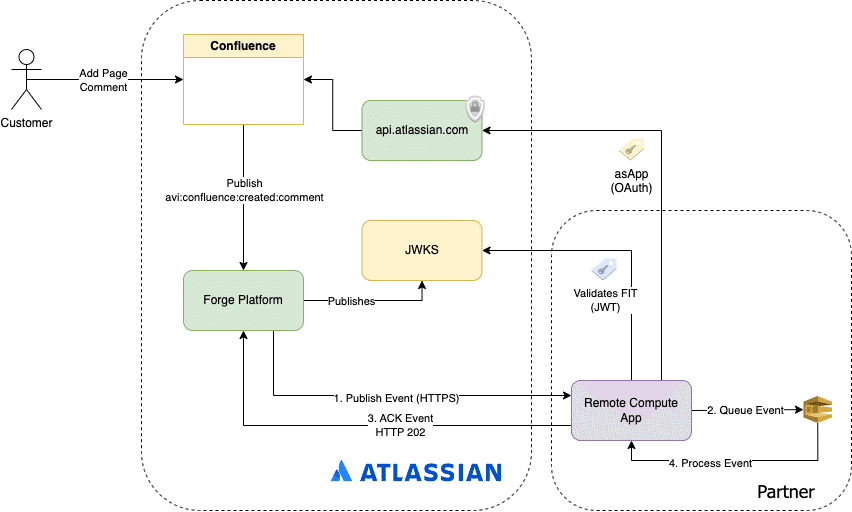Sending Atlassian app and lifecycle events to a remote
You can configure Atlassian app events and lifecycle events to be delivered directly to your remote backend. Specify remote endpoints in your app’s manifest and Forge will automatically route events along with a Forge Invocation Token and an optional app access token.
Timeouts and asynchronous events
Given the high-volume nature of Forge events, remote invocations will have a timeout of 5 seconds. Your app needs to implement processing logic in an asynchronous fashion (for example, enqueuing events for a worker to process asynchronously). The diagram below illustrates such a solution.

Getting started
To configure events to be delivered to your remote backend, in your manifest.yml:
- Specify the
endpointyour app will send remote requests to. This is done using theendpointproperty of thetriggermodule defined for the event. Usingendpointrather thanfunctiontells Forge that your app will invoke your remote endpoint. - Define an
endpointitem with akeymatching theendpointname you specified in the previous step.- Set the
remoteproperty to the key that uniquely identifies the remote system the endpoint will communicate with. - Set the
route.pathto the REST API operation path to be appended to the remote’s baseUrl, to invoke the desired REST API. - If you want Forge to provide a system token, request it in the
authproperty.
- Set the
- Define a
remotesitem with a key matching the remote name you specified in the endpoint, setting the baseUrl to the site URL prefix to prepend to the routes specified in your app's route.path.
Example manifest
Here’s an example manifest.yml of a module that routes an event to /frc-event when a Confluence comment is added:
1 2modules: trigger: - key: remote-comment-trigger-node endpoint: remote-events-node events: - avi:confluence:created:comment endpoint: - key: remote-events-node remote: remote-app-node route: path: /frc-event auth: appSystemToken: enabled: true permissions: scopes: - read:app-system-token - read:confluence-content.summary remotes: - key: remote-app-node baseUrl: https://forge-remote-refapp-nodejs.services.atlassian.com
Verifying requests
You will need to verify the requests received by your remote came from Atlassian and are intended for your app. For more information on how to do this, see Verifying remote requests.
Handling retries
If the remote endpoint returns a non-2xx response or if the invocation times out when delivering an event to a remote endpoint (the timeout period for an event invocation is 5 seconds), redelivery will be attempted as described by the note regarding retryOptions below.
Information on the retry attempt will be provided in the retryContext property sent in the HTTP request body. For example:
1 2{ "payload": { ... "retryContext": { "retryData": null, "retryCount": 2, "retryReason": "INVALID_REMOTE_INVOCATION_ERROR" } ... } }
See the developer documentation for retrying Atlassian app events for more information.
retryOptions cannot be set from remote invocations. By default:
- All remote Atlassian app event invocations will be retried with a delay of 60 seconds per request.
- Events will be retried up to a maximum of 4 attempts.
retryDatawill always benull.retryReasoncan be the following:INVALID_REMOTE_INVOCATION_ERRORGeneral error. For example; the response from the remote server was non 2XX, the response did not follow the API contract defined in the Forge Remote Preview documentation or there was a network error.TIMEOUT_ERRORThe request timed out.INVALID_FORGE_INVOCATION_TOKENThe invocation token could not be validated and the remote server responds with a 401.
Atlassian app events
To see all the events that can be sent (including required scopes), see the events for each Atlassian app:
Lifecycle events
To see what events your Forge app can subscribe to, see Lifecycle events.
Next steps
Now that you’ve verified the requests and have received your access tokens, you can:
Rate this page: